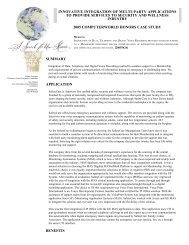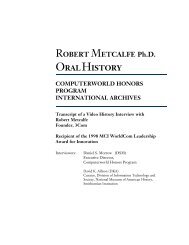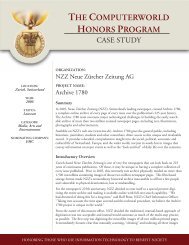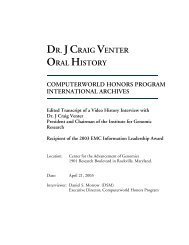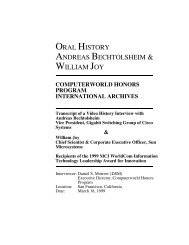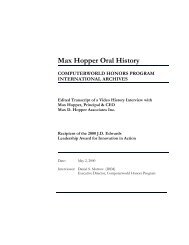NATHAN MYHRVOLD PhD ORAL HISTORY - The Computerworld ...
NATHAN MYHRVOLD PhD ORAL HISTORY - The Computerworld ...
NATHAN MYHRVOLD PhD ORAL HISTORY - The Computerworld ...
Create successful ePaper yourself
Turn your PDF publications into a flip-book with our unique Google optimized e-Paper software.
<strong>The</strong> second thing is, wasn’t Chuck Yeager that broke the sound barrier, but that<br />
Sauropods did it earlier, and it took over 100 million years before another species on<br />
earth learned the trick, and figured out how to go faster than the speed of sound.<br />
DA: One last question that I have for you. We haven’t talked too much about<br />
your vision of the future and we could spend another three or four hours on that.<br />
NM: That’s my job after all.<br />
DA: I wonder if they’re a couple of things that you feel like you really see coming<br />
that you’d like to comment on maybe different from sort of what you see others<br />
saying, and if there are a couple of things that you may have some concern about<br />
coming out of this technology. Just to sort of wrap things up here.<br />
NM: Well I think that computer information communications technology is all<br />
becoming a blur in one topic. Paradoxically it is over hyped in the short run, and<br />
under hyped in the long run. In the short run, we read everyday about some new<br />
breakthrough, and some new Internet company’s going to take over the world, and<br />
all of a sudden the company’s worth a billion dollars, and you know, oh my god the<br />
world will change by next Thursday, and they’ll be convergence of TV and<br />
computers and the sewing machines and god knows what.<br />
A lot of it is very over-wrought. Yet in the long run I think it’s under hyped, because<br />
I think people miss the tremendous power of putting people in touch with another in<br />
new ways. If you want a one-person talk to another person, the telephone is a great<br />
way. It changed person-to-person communications. It abstracted geography from it<br />
largely. It only works at the one to one level. Conference calls for work for like ten<br />
people, past that it gets very unwieldy, and people don’t even like doing conference<br />
calls.<br />
Television worked in another mode. It worked from one to a million. So if you sit<br />
down in front of the TV camera now, circa 1998, it’s hard to address less than a<br />
million people because broadcast channels are precious. We share only a small<br />
number across the whole population. Although not a million people may not choose<br />
to watch it, you have to offer it to a million, and you have to make the opportunity<br />
meet cost assessment, is this worth a million? But television has changed the world,<br />
because one to a million is very important. And by abstracting geography out of the<br />
one to a million thing, it’s had enormous effects on culture and politics and every<br />
aspect of today’s life.<br />
Nathan Myhrvold<br />
Oral History<br />
44



